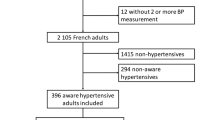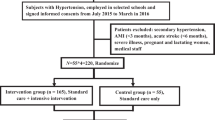Abstract
Apparent treatment-resistant hypertension (aTRH) is associated with adverse cardiovascular outcomes. aTRH is common and disproportionately affects African Americans. The objective of this study is to explore psychosocial correlates of aTRH in a population-based cohort of African Americans with hypertension. The sample included 1392 participants in the Jackson Heart Study with treated hypertension who reported being adherent to their antihypertensive medications. aTRH was defined as uncontrolled clinic BP (⩾140/90 mm Hg) with ⩾3 classes of antihypertensive medication or treatment with ⩾4 classes of antihypertensive medication, including a diuretic. Self-reported medication adherence was defined as taking all prescribed antihypertensive medication in the 24 h before the study visit. The association of psychosocial factors (chronic stress, depressive symptoms, perceived social support and social network) with aTRH was evaluated using Poisson regression with progressive adjustment for demographic, clinical and behavioural factors. The prevalence of aTRH was 15.1% (n=210). Participants with aTRH had lower social network scores (that is, fewer sources of regular social contact) compared with participants without aTRH (P<0.01). No other psychosocial factors differed between groups. Social network was also the only psychosocial factor that was associated with aTRH prevalence in regression analyses. In age-, sex-adjusted and fully adjusted models, one additional unique source of social contact was associated with a 19% (PR=0.81; 95% confidence interval (CI): 0.68–0.94, P=0.001) and a 13% (PR=0.87; 95% CI 0.74–1.0, P=0.041) lower prevalence of aTRH, respectively. Social network was independently associated with aTRH and warrants further investigation as a potentially modifiable determinant of aTRH in African Americans.
This is a preview of subscription content, access via your institution
Access options
Subscribe to this journal
Receive 12 digital issues and online access to articles
$119.00 per year
only $9.92 per issue
Buy this article
- Purchase on Springer Link
- Instant access to full article PDF
Prices may be subject to local taxes which are calculated during checkout

Similar content being viewed by others
Change history
07 June 2017
This article has been corrected since Advance Online Publication and a corrigendum is also printed in this issue.
References
Calhoun DA, Jones D, Textor S, Goff DC, Murphy TP, Toto RD et al. Resistant hypertension: diagnosis, evaluation, and treatment: a scientific statement from the American Heart Association Professional Education Committee of the Council for High Blood Pressure Research. Circulation 2008; 117: e510–e526.
Howard VJ, Tanner RM, Anderson A, Irvin MR, Calhoun DA, Lackland DT et al. Apparent treatment-resistant hypertension among individuals with history of stroke or transient ischemic attack. Am J Med 2015; 128: 707–714, e2.
Judd E, Calhoun DA . Apparent and true resistant hypertension: definition, prevalence and outcomes. J Hum Hypertens 2014; 28: 463–468.
Irvin MR, Shimbo D, Mann DM, Reynolds K, Krousel-Wood M, Limdi NA et al. Prevalence and correlates of low medication adherence in apparent treatment-resistant hypertension. J Clin Hypertens 2012; 14: 694–700.
Sim JJ, Bhandari SK, Shi J, Liu IL, Calhoun DA, McGlynn EA et al. Characteristics of resistant hypertension in a large, ethnically diverse hypertension population of an integrated health system. Mayo Clin Proc 2013; 88: 1099–1107.
Tanner RM, Calhoun DA, Bell EK, Bowling CB, Gutierrez OM, Irvin MR et al. Prevalence of apparent treatment-resistant hypertension among individuals with CKD. Clin J Am Soc Nephrol 2013; 8: 1583–1590.
Shimbo D, Levitan EB, Booth JN 3rd, Calhoun DA, Judd SE, Lackland DT et al. The contributions of unhealthy lifestyle factors to apparent resistant hypertension: findings from the Reasons for Geographic and Racial Differences in Stroke (REGARDS) study. J Hypertens 2013; 31: 370–376.
Ford CD, Sims M, Higginbotham JC, Crowther MR, Wyatt SB, Musani SK et al. Psychosocial factors are associated with blood pressure progression among African Americans in the Jackson Heart Study. Am J Hypertens 2016; 29: 913–924.
Cornwell EY, Waite LJ . Social network resources and management of hypertension. J Health Soc Behav 2012; 53: 215–231.
Steptoe A, Kivimaki M . Stress and cardiovascular disease: an update on current knowledge. Annu Rev Public Health 2013; 34: 337–354.
Taylor HA Jr, Wilson JG, Jones DW, Sarpong DF, Srinivasan A, Garrison RJ et al. Toward resolution of cardiovascular health disparities in African Americans: design and methods of the Jackson Heart Study. Ethn Dis 2005; 15: S6–4-17.
Payne TJ, Wyatt SB, Mosley TH, Dubbert PM, Guiterrez-Mohammed ML, Calvin RL et al. Sociocultural methods in the Jackson Heart Study: conceptual and descriptive overview. Ethn Dis 2005; 15 (Suppl 6): 38–48.
Radloff LS . The CES-D scale: a self report depression scale for research in the general population. Appl Psychol Meas 1977; 1: 385–401.
Cohen S, Hoberman H . Positive events and social supports as buffers of life change stress. J Appl Soc Psychol 1983; 13: 99–125.
Berkman LF, Syme SL . Social networks, host resistance, and mortality: a nine-year follow-up study of Alameda County residents. Am J Epidemiol 1979; 109: 186–204.
Hickson DA, Diez Roux AV, Wyatt SB, Gebreab SY, Ogedegbe G, Sarpong DF et al. Socioeconomic position is positively associated with blood pressure dipping among African-American adults: the Jackson Heart Study. Am J Hypertens 2011; 24: 1015–1021.
Stevens LA, Schmid CH, Greene T, Zhang YL, Beck GJ, Froissart M et al. Comparative performance of the CKD Epidemiology Collaboration (CKD-EPI) and the Modification of Diet in Renal Disease (MDRD) Study equations for estimating GFR levels above 60 mL/min/1.73 m2. Am J Kidney Dis 2010; 56: 486–495.
Smitherman TA, Dubbert PM, Grothe KB, Sung JH, Kendzor DE, Reis JP et al. Validation of the Jackson Heart Study Physical Activity Survey in African Americans. J Phys Act Health 2009; 6: S124–S132.
Carithers T, Dubbert PM, Crook E, Davy B, Wyatt SB, Bogle ML et al. Dietary assessment in African Americans: methods used in the Jackson Heart Study. Ethn Dis 2005; 15: S6–49-55.
Spruill TM, Shallcross AJ, Ogedegbe G, Chaplin WF, Butler M, Palfrey A et al. Psychosocial correlates of nocturnal blood pressure dipping in African Americans: The Jackson Heart Study. Am J Hypertens 2016; 29: 904–912.
Maxwell SE . The persistence of underpowered studies in psychological research: causes, consequences, and remedies. Psychol Methods 2004; 9: 147–163.
Perneger TV . What's wrong with Bonferroni adjustments. BMJ 1998; 316: 1236–1238.
Berkman LF . Social support, social networks, social cohesion and health. Soc Work Health Care 2000; 31: 3–14.
Eng PM, Rimm EB, Fitzmaurice G, Kawachi I . Social ties and change in social ties in relation to subsequent total and cause-specific mortality and coronary heart disease incidence in men. Am J Epidemiol 2002; 155: 700–709.
Shaya FT, Chirikov VV, Daniel Mullins C, Shematek J, Howard D, Foster C et al. Social networks help control hypertension. J Clin Hypertens 2013; 15: 34–40.
Pickering TG . Mental stress as a causal factor in the development of hypertension and cardiovascular disease. Curr Hypertens Rep 2001; 3: 249–254.
Davidson K, Jonas BS, Dixon KE, Markovitz JH . Do depression symptoms predict early hypertension incidence in young adults in the CARDIA study? Coronary Artery Risk Development in Young Adults. Arch Intern Med 2000; 160: 1495–1500.
Delaney JA, Oddson BE, Kramer H, Shea S, Psaty BM, McClelland RL . Baseline depressive symptoms are not associated with clinically important levels of incident hypertension during two years of follow-up: the multi-ethnic study of atherosclerosis. Hypertension 2010; 55: 408–414.
Heaney CA, Israel BA. Social networks and social support. In: Glanz K, Rimer BK, Lewis FM (eds). Health Behavior and Health Education: Theory, Research and Practice, 3rd edn. Jossey-Bass: San Francisco, CA, USA, 2002, pp 185–209.
Kossinets G, Watts DJ . Empirical analysis of an evolving social network. Science 2006; 311: 88–90.
Schoenthaler AM, Schwartz J, Cassells A, Tobin JN, Brondolo E . Daily interpersonal conflict predicts masked hypertension in an urban sample. Am J Hypertens 2010; 23: 1082–1088.
Kawachi I, Colditz GA, Ascherio A, Rimm EB, Giovannucci E, Stampfer MJ et al. A prospective study of social networks in relation to total mortality and cardiovascular disease in men in the USA. J Epidemiol Community Health 1996; 50: 245–251.
Rozanski A, Blumenthal JA, Davidson KW, Saab PG, Kubzansky L . The epidemiology, pathophysiology, and management of psychosocial risk factors in cardiac practice: the emerging field of behavioral cardiology. J Am Coll Cardiol 2005; 45: 637–651.
Cohen S, Wills TA . Stress, social support, and the buffering hypothesis. Psychol Bull 1985; 98: 310–357.
Uchino BN, Cacioppo JT, Kiecolt-Glaser JK . The relationship between social support and physiological processes: a review with emphasis on underlying mechanisms and implications for health. Psychol Bull 1996; 119: 488–531.
Umberson D, Crosnoe R, Reczek C . Social relationships and health behavior across life course. Annu Rev Sociol 2010; 36: 139–157.
Diaz KM, Veerabhadrappa P, Brown MD, Whited MC, Dubbert PM, Hickson DA . Prevalence, determinants, and clinical significance of masked hypertension in a population-based sample of African Americans: The Jackson Heart Study. Am J Hypertens 2015; 28: 900–908.
Acknowledgements
We thank the participants and data collection staff of the Jackson Heart Study. The views expressed in this manuscript are those of the authors and do not necessarily represent the views of the National Heart, Lung and Blood Institute; the National Institutes of Health; or the US Department of Health and Human Services. The Jackson Heart Study is supported by contracts HHSN268201300046C, HHSN268201300047C, HHSN268201300048C, HHSN268201300049C, HHSN268201300050C from the National Heart, Lung and Blood Institute, and the National Institute on Minority Health and Health Disparities.
Author information
Authors and Affiliations
Corresponding author
Ethics declarations
Competing interests
The authors declare no conflict of interest.
Rights and permissions
About this article
Cite this article
Shallcross, A., Butler, M., Tanner, R. et al. Psychosocial correlates of apparent treatment-resistant hypertension in the Jackson Heart Study. J Hum Hypertens 31, 474–478 (2017). https://doi.org/10.1038/jhh.2016.100
Received:
Revised:
Accepted:
Published:
Issue Date:
DOI: https://doi.org/10.1038/jhh.2016.100



